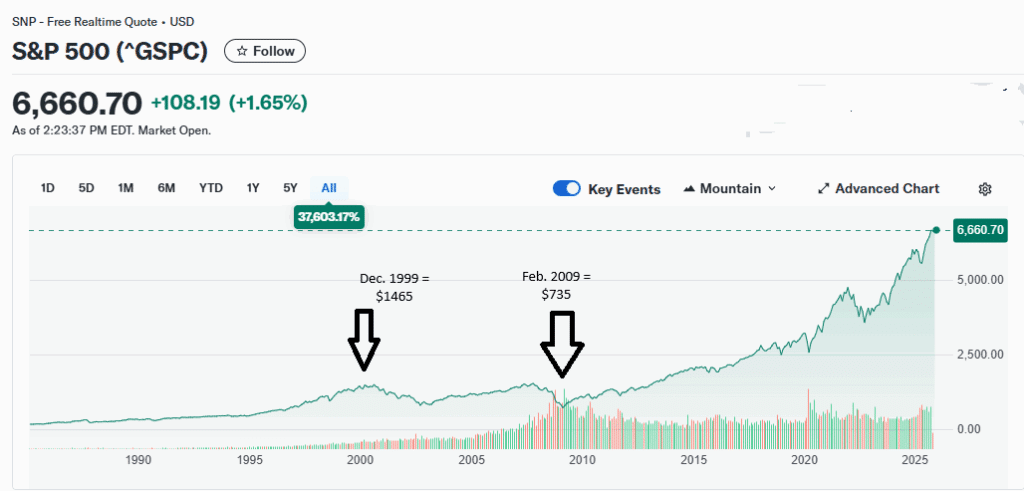“The market can stay irrational longer than you can stay solvent,” by John Maynard Keynes
By most popular valuation metrics the stock market is overvalued. According to “The Buffett Indicator,” which divides the total US stock market value ($65.47T) by the gross domestic product ($30.15T), the US stock markets valuation in June, 2025 was 217% or roughly 68.63% above the historical average. In this article, we’ll explore what “overvalued” means, examine key valuation metrics and share smart strategies for investing in today’s richly priced market.
What Does an Overvalued Stock Market Mean?
Shiller P/E Ratio (CAPE)
One of the most respected valuation tools, the Shiller or CAPE (Cyclically Adjusted Price-to-Earnings) ratio, compares today’s S&P 500 price to the average inflation-adjusted earnings over the past 10 years. This method smooths out earnings volatility and adjusts for inflation.
- October 2025 Shiller P/E Ratio: 39.00
- Historical Average: 17.29
- Implied Overvaluation: ~126%
S&P 500 Price-to-Sales Ratio
This metric divides the S&P 500’s market price by its trailing 12-month sales (as of March 2025):
- Current Ratio: 3.31
- Historical Average: 1.80
- Implied Overvaluation: ~84%
Buffett Indicator
As mentioned earlier, the Buffett Indicator currently sits at 217%, suggesting the market is strongly overvalued.
Taken together, these metrics suggest the market is overvalued by 69% to 126%, depending on the measure.
Is the Stock Market in a Bubble Now?
Historically, the only time the Shiller P/E ratio exceeded today’s level was in October 1999, when it hit 44.19. That peak preceded the dot-com crash, during which the S&P 500 fell from $1,465 in December 1999 to $735 in February 2009.
Does this mean a stock market crash is coming? Not necessarily. Markets tend to revert to their mean valuations, but timing corrections is notoriously difficult.

S&P Value from 1985 – 2025
Source: yahoo!finance
For those of you who don’t remember, at it’s peak valuation the S&P 500 was priced at $1,465 in December 1999. During the ensuing decade, as the dot com boom ended and the tech bubble burst, the stock market fell to $735 in February 2009.
Does that mean that a stock market crash is coming?
Not necessarily. The stock market typically reverts to its mean valuation, eventually. But the timing of the next stock market decline is unknown.
Maybe the Stock Market Isn’t in a Bubble
Some analysts argue that AI-driven productivity could justify higher valuations. If corporate earnings grow faster than asset prices, valuations could normalize without a crash.
Others believe that today’s market leaders are profitable and established, unlike the speculative tech firms of the late 1990s. At the close of the last millennium, many companies with minimal earnings were richly valued.
Where to Invest in an Overvalued Market?
In the “S&P Value from 1985 – 2025” chart above, stock market prices have peaks and valleys, yet the long term trend remains upward. Those that sell during downturns typically get burned. That’s because you need to be correct twice, first, when to get out, and second, when to get back in.
Timing the market and picking the best times to get in and get out is a fool’s errand. The best strategy for investing is to choose an investment strategy and stick with it. Just remember not to put money in the stock market that you’ll need in the next five to seven years, because in the short term, the stock market pricing is quite volatile.

Source: Calamos Asset Class Quilt
The asset class quilt image above, underscores the importance of maintaining a diversified investment portfolio. Pay attention to U.S. stocks annual performance and you’ll find some years, returns are at the top, while in others they underperform other asset classes.
Here are several investing ideas for a richly valued stock market:
Where to Invest in an Overvalued Stock Market
1. Cash Investing
After years of near-zero interest rates, cash isn’t such a bad place to be anymore. If you’re skittish about the U.S. stock market valuation today, you can get paid to wait for fairer valuations by investing in cash.
Granted this is a capital preservation strategy, not a growth approach. Yet, sometimes cash preservation is a wise tactic, especially in a richly valued investment market.
Platforms like M1 Finance and Wealthfront provide competitive cash accounts.
2. Bond Investing
Bond ETFs and individual bonds offer capital preservation and income. Bond investors can choose from conservative Treasury bond ETFs to riskier Corporate and High yield bond ETFs. The current declining interest rate environment typically provides bond appreciation and higher yields than your bank savings account.
3. Dogs of the Dow
If you’re wondering whether stocks are overvalued right now, but don’t want to avoid the U.S. stock market, you might investigate the “Dogs of the Dow” strategy. The Dogs of the Dow, popularized by Michael B. O’Higgins in 1991, recommends buying the 10 highest dividend yield stocks every January, and selling in December (if they’re not on the list).
For a hands-off approach consider the ALPS Sector Dividend Dogs ETF (SDOG), with a 0.36% annual expense ratio.
Is the Stock Market Overvalued? Wrap Up
While today’s stock market valuations may appear stretched by historical standards, that doesn’t mean investors should retreat entirely. History shows that markets can remain elevated for extended periods, and timing a correction is notoriously difficult. Instead of trying to outguess the market, focus on building a resilient portfolio that aligns with your goals and risk tolerance.
Diversification remains your best defense against uncertainty. Whether you lean into high-yield cash accounts, broaden your exposure with bonds, or selectively invest in dividend-rich equities like the Dogs of the Dow, the key is to stay disciplined. Remember, investing isn’t about predicting the next downturn—it’s about preparing for it. By maintaining a long-term perspective and embracing a balanced strategy, you’ll be better positioned to weather volatility and capitalize on future opportunities when valuations normalize.
FAQ
There’s no definitive answer, but high stock market valuations frequently precede stock market crashers. The issue is that many events might precipitate a stock market crash, and it’s difficult to predict when a crash might occur.
According to the current Price Earnings and Shiller (or CAPE) PE ratios, the Buffett Indicator and the Price to Sales ratio, stocks are overvalued. But stocks can remain overvalued for long periods of time. And within specific individual companies, sectors and geographies, it’s possible to find reasonably valued assets.
Related
- The Definitive Guide To ETFs vs. Mutual Funds
- Best Asset Allocation Based On Age And Risk Tolerance
- Should I Invest In An IPO?
- Historical Stock And Bond Returns Help To Predict Future Value
- What Does Price Earnings Ratio Mean? Use the PE for Smart Investing
Sources:
- https://www.multpl.com
- https://finance.yahoo.com/quote/%5EGSPC
- Dogs of the Dow – Overview, How It Works, Example
- https://currentmarketvaluation.com
Disclosure: Please note that this article may contain affiliate links which means that – at zero cost to you – I might earn a commission if you sign up or buy through the affiliate link. That said, I never recommend anything I don’t believe is valuable.
I have an account with M1 Finance
M1 Disclosure: This content is not a solicitation, is not endorsed by M1, and was not reviewed by M1; the opinions expressed are solely those of the authors and do not reflect M1’s views. Information presented is accurate as of the video posting date; for the most up-to-date information, please refer to m1.com. Before making any investment decisions, consult your personal investment, legal, and tax advisors, as this content is for informational purposes only and not intended as investment recommendations.
The post Is The Stock Market Overvalued? Where To Invest In An Overvalued Stock Market appeared first on Barbara Friedberg.






